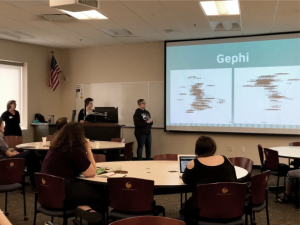
For many, written correspondence is a thing of the past. With the rise of emails, texting, FaceTiming and other digital forms of communication, handwritten letters are usually reserved for special occasions, if used at all. But for historians, written correspondence offers a unique — and essential — method of investigating the past.
Housed in the UCF Department of History, PRINT — People, Religion, Information Networks, and Travel — aims to visualize and make accessible the connections between three religious minorities, Anabaptists, Quakers and Pietists, by providing access to manuscript correspondence through network visualizations. To accomplish this, the project utilizes roughly 3,000 letters written between 1630 and 1730, drawing from repositories in the United Kingdom, the Netherlands, Germany and the United States.
In addition to making this correspondence accessible to the public, PRINT allows users to create custom visualizations of the connections between the letter writers and the people mentioned in the letters. Rosalind Beiler, associate professor of history and co-principal investigator for the project, is especially interested in the insight these letters offer into the lives of their writers.
“The letters themselves contain so much rich information about the lives of ordinary people — families, men, women, children — that we want others to be able to use them for their own research interests,” says Beiler. “PRINT provides a window into the lives of ordinary people living in the 1600s and 1700s and allows us to see how some of the issues they faced then still resonate with us today.”
PRINT offers public-facing workshops that invite participants to examine historical correspondence. On February 10, the UCF PRINT team hosted “Loving Friend”: Transcribing Quaker Letters in PRINT, a workshop administered by the Pennsylvania Historical and Museum Commission at the Ephrata Cloister in Pennsylvania. Participants in the workshop were able to try their hand at reading a letter from 1686 — a trickier task than one might expect.
“Handwriting in the seventeenth century differs significantly from today, as do word spellings and language,” explains Beiler. “The letter was written by a Quaker who wants to learn about life in the newly founded colony of Pennsylvania. As participants in the workshop work together to decipher the words and their meanings in the letter, they also learn a lot about how English people perceived the colonies and about what piqued their curiosity.”
Cassidy Michonski, a history graduate student, was inspired to begin working with PRINT when she took one of Beiler’s classes and transcribed a 17th-century letter from the Pemberton family of Quakers. The amount of information contained in the letter inspired her to reach out to Beiler, and she’s been a part of the project ever since.
“The upcoming workshops are one of my favorite parts of my position,” says Michonski. “I love sharing these letters and their significance with the public and hopefully encouraging them to get involved with the project, or at least excited about history. Another aspect of our research that I am excited about is the launch of our project on Zooniverse! This platform is designed for crowdsourcing transcriptions of our letters which will allow the public to become more involved in the project, while helping us with the transcriptions.”
“I love helping people learn to read the handwritten documents that usually start out looking like a foreign language,” adds Beiler. “But even more, I enjoy seeing participants make connections to the people living in the past. We tend to think of history as a series of big events but, in fact, it’s made up of lots of ordinary people like ourselves making decisions every day about how to live our lives. My favorite part of these workshops is when participants make that emotional connection to the real human beings who lived in the past.”
On March 16, PRINT will host Intimate Connections, a virtual transcription workshop in collaboration with the Historical Society of Pennsylvania. Click here to learn more and register. To learn more about PRINT at UCF, visit the project’s website.
